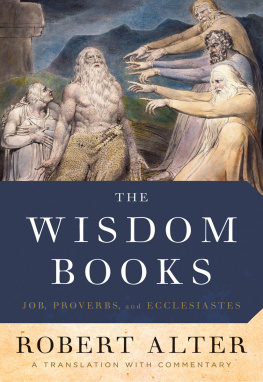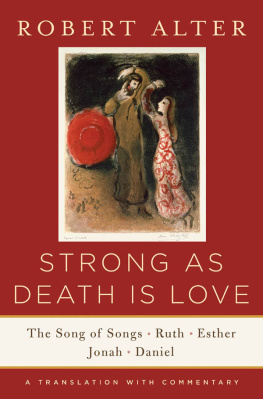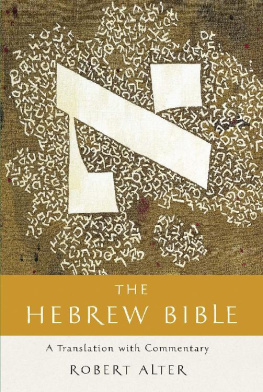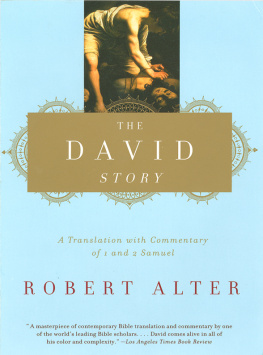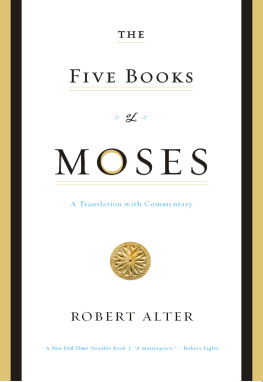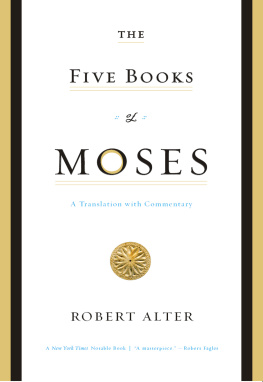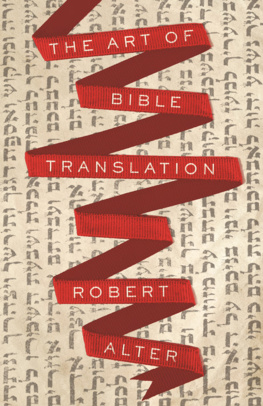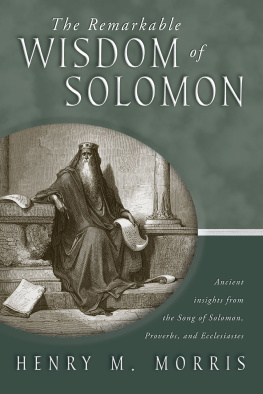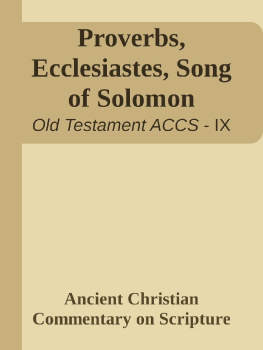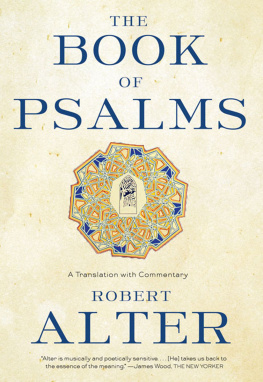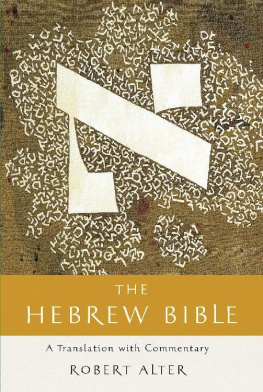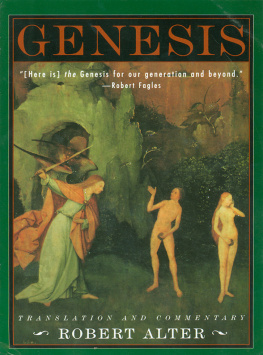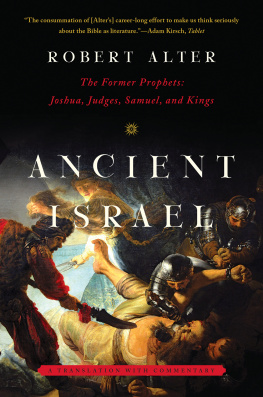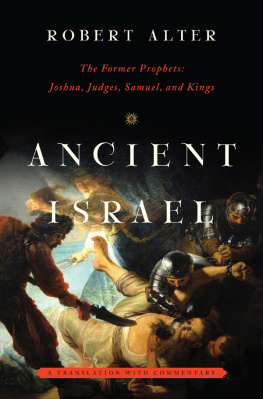ACKNOWLEDGMENTS
M ost of the manuscript was prepared by Janet Livingstone, who as in the past did an admirable job in bringing electronic order out of my handwritten chaos. A substantial section of Job was typed by Margarita Zaydman with scrupulous care. Yosefa Raz checked the translations against the original with a keen eye to inconsistencies and places where I had inadvertently skipped a word in the Hebrew. The entire manuscript was read by two dear friends, Michael Bernstein, who helped me to avoid doing more violence to the English language than strictly necessary, and Ron Hendel, whose knowledge of biblical scholarship and the ancient Near East saved me from a good many mistakes. The results of an undertaking of this sort are bound to be imperfect, and those who helped me of course bear no responsibility for the flaws. Research expenses for the book were covered by funds from the Class of 1937 Chair at the University of California at Berkeley.
ALSO BY ROBERT ALTER
PEN OF IRON: AMERICAN PROSE AND THE KING JAMES BIBLE
THE BOOK OF PSALMS: A TRANSLATION WITH COMMENTARY
IMAGINED CITIES: URBAN EXPERIENCE AND THE LANGUAGE OF THE NOVEL
THE FIVE BOOKS OF MOSES: A TRANSLATION WITH COMMENTARY
CANON AND CREATIVITY:
MODERN WRITING AND THE AUTHORITY OF SCRIPTURE
THE DAVID STORY: A TRANSLATION WITH COMMENTARY
GENESIS: A TRANSLATION WITH COMMENTARY
HEBREW AND MODERNITY
THE WORLD OF BIBLICAL LITERATURE
NECESSARY ANGELS: TRADITION AND MODERNITY
IN KAFKA, BENJAMIN, AND SCHOLEM
THE PLEASURES OF READING IN AN IDEOLOGICAL AGE
THE LITERARY GUIDE TO THE BIBLE ( coeditor with Frank Kermode )
THE INVENTION OF HEBREW PROSE
THE ART OF BIBLICAL POETRY
MOTIVES FOR FICTION
THE ART OF BIBLICAL NARRATIVE
A LION FOR LOVE: A CRITICAL BIOGRAPHY OF STENDHAL
DEFENSES OF THE IMAGINATION
PARTIAL MAGIC: THE NOVEL AS SELF-CONSCIOUS GENRE
MODERN HEBREW LITERATURE
AFTER THE TRADITION
FIELDING AND THE NATURE OF THE NOVEL
ROGUES PROGRESS: STUDIES IN THE PICARESQUE NOVEL
FOR FURTHER READING
Alter, Robert. The Art of Biblical Narrative. New York: Basic Books, 1985.
Includes chapters on Job and Proverbs that attempt to define the distinctive poetic form of each and to describe its role in articulating a particular vision of the world.
Alter, Robert, and Frank Kermode. The Literary Guide to the Bible. Cambridge, Mass.: Harvard University Press, 1987.
Includes an instructive essay on Job by Moshe Greenberg and a lucid account of Proverbs and Qohelet by James G. Williams that sets both books in the larger context of biblical Wisdom writing.
Crenshaw, James L. Old Testament Wisdom: An Introduction. Atlanta: John Knox Press, 1981.
An historically informed scholarly investigation of the Wisdom books of the Bible and of what can be reconstructed of Wisdom activity in ancient Israel.
Fox, Michael V. Proverbs 1-9. Garden City, N.Y.: Doubleday, 2000. Proverbs 1031. New Haven, Conn.: Yale University Press, 2009.
These two volumes are among the best in the Anchor Bible Series, keen in philological analysis and copious in their treatment of the meanings of the text and of its ancient Near Eastern backgrounds.
. Qohelet and His Contradictions. Sheffield, England: Almond Press, 1989.
A study rich in reflections on Qohelets philosophy and acute in the philological treatment of the Hebrew text, including its many cruces.
Gordis, Robert. Qohelet: The Man and His World. New York: The Jewish Theological Seminary of America, 1951.
A translation and commentary that contain valuable philological work, though some of the views expressed are now dated.
Murphy, Roland E. The Tree of Life: An Exploration of Biblical Wisdom Literature. New York: Doubleday, 1990.
A succinct, clear, and helpful survey of the Wisdom books of the Bible and the Apocrypha and of their later legacy.
Pope, Marvin. Job. Garden City, N.Y.: Doubleday, 1965.
A scholarly translation and relatively brief commentary incorporating some useful illumination of the language of the text and its historical contexts, though much of the philology follows scholarly fashions of the day that are no longer viable.
Rad, Gerhard von. Wisdom in Israel. Nashville: Abingdon Press, 1978.
A thoughtful series of reflections on the Wisdom books, their background, and the outlooks they express by one of the leading German Bible scholars of the mid-twentieth century.
Williams, James G. Those Who Ponder Proverbs. Sheffield, England: Almond Press, 1981.
An intelligent consideration of the Wisdom books that devotes special attention to the proverb as a literary form.
INTRODUCTION
T he Book of Job is in several ways the most mysterious book of the Hebrew Bible. Formally, as a sustained debate in poetry, it resembles no other text in the canon. Theologically, as a radical challenge to the doctrine of reward for the righteous and punishment for the wicked, it dissents from a consensus view of biblical writersa dissent compounded by its equally radical rejection of the anthropocentric conception of creation that is expressed in biblical texts from Genesis onward. Its astounding poetry eclipses all other biblical poetry, working in the same formal system but in a style that is often distinct both lexically and imagistically from its biblical counterparts. Despite all these anomalous traits, it was quickly embraced by the framers of biblical tradition: extensive fragments of an Aramaic translation found in the caves at Qumran suggest that by the second century BCE the Dead Sea sectarians (and no doubt others) already regarded Job as part of the incipient canon of sacred texts.
As is the case with so many other biblical books, we know nothing about the author of Jobnot his class background and certainly not any of his biographical details and not even with any certainty the time when he wrote. Some scholars, perplexed by the many peculiarities of the book, and especially by the linguistic ones, have speculated that it is a translation from Aramaic, or Edomite, or even Arabic. There is virtually no evidence for such ascriptions, and they seem especially untenable in light of the greatness of the Hebrew poetry of Job, rich as it is in strong rhythmic effects, virtuosic wordplay and sound-playqualities that a translation would be very unlikely to exhibit.
The Book of Job belongs to the international movement of ancient Near Eastern Wisdom literature in its universalist perspectivethere are no Israelite characters in the text, though all the speakers are monotheists, and there is no reference to covenantal history or to the nation of Israeland it is equally linked with Wisdom literature in its investigation of the problem of theodicy. The troubling phenomenon of the suffering of the just is addressed in roughly analogous texts both in Mesopotamia and Egypt, though any direct influence of these on the Job poet is questionable. Scholars have often assumed that there were Wisdom schools in ancient Israel and elsewhere in the region where disciples guided by teachers mastered, and in all likelihood memorized, instructional texts and imbibed the general principles for leading a just and prudent life. It is hard to imagine that the Job poet could have been part of any such institutional setting, given the radical nature of his views. One should probably think of him, then, as a writer working alonea bold dissenting thinker and a poet of genius who produced a book of such power that Hebrew readers soon came to feel they couldnt do without it, however vehement its swerve from the views of the biblical majority.
No confident agreement among scholars on the date of the book has been reached. There are still a few stubborn adherents to the view that it was composed early in the First Temple period, though, as I shall explain, the linguistic evidence argues against that notion. The frame-story (Chapters 1 and 2, concluded in Chapter 42) is in all likelihood a folktale that had been in circulation for centuries, probably through oral transmission. In the original form of the story, with no debate involved, the three companions would not have appeared: instead, Job would have been tested through the wager between God and the Adversary, undergone his sufferings, and in the end would have had his fortunes splendidly restored. A passing mention in Ezekiel 14:14 and 19 of Job, together with Noah and Daniel (not the Daniel of the biblical book) as one of three righteous men saved from disaster, reflects the presence of a Job figureperhaps featuring in the same plot as that of the frame-storyin earlier folk tradition. The author of the Book of Job, however, has either reworked an old text or formulated his own text on the basis of oral tradition, using archaizing language. There is an obvious effort in the frame-story to evoke the patriarchal age, though in a foreign land with non-Israelites, but the neat symmetries of formulaic numbers and the use of prose refrains resemble nothing in the Patriarchal Narrative in Genesis. The style of the frame-story gives the general impression of early First Commonwealth Hebrew prose, but here and there a trait of Late Biblical Hebrew shows throughfor example, the use of the verb qabel in 2:10 for accept, a verb that occurs in late texts such as Esther and Chronicles but not in earlier biblical writing. Other late usages, such as a couple of the prepositions that follow verbs here, have been detected by Avi Hurvitz, a historian of biblical Hebrew.

